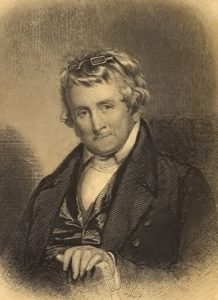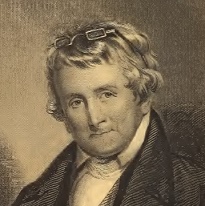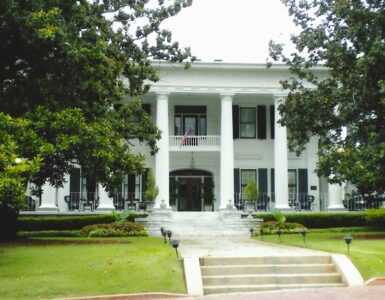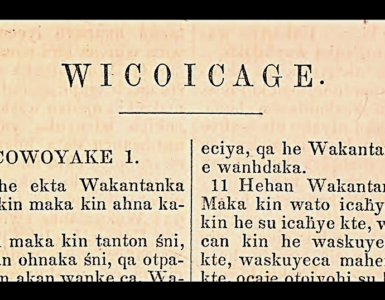 In the summer of 1843, seminary professor Archibald Alexander made a lengthy trip by train from his residence on the campus of Princeton Theological Seminary to his place of birth in Lexington, Virginia. Alexander was a son of the Shenandoah Valley who spent many years of his life in Philadelphia and Princeton, New Jersey. His journey was not only a homecoming but also a remembrance and memorial to his past. On June 29th he participated in the commencement exercises of Washington College (Washington and Lee University). Professor Alexander delivered an address to the alumni association about education in general and his remembrances of William Graham, his mentor and friend, who founded Washington College.
In the summer of 1843, seminary professor Archibald Alexander made a lengthy trip by train from his residence on the campus of Princeton Theological Seminary to his place of birth in Lexington, Virginia. Alexander was a son of the Shenandoah Valley who spent many years of his life in Philadelphia and Princeton, New Jersey. His journey was not only a homecoming but also a remembrance and memorial to his past. On June 29th he participated in the commencement exercises of Washington College (Washington and Lee University). Professor Alexander delivered an address to the alumni association about education in general and his remembrances of William Graham, his mentor and friend, who founded Washington College.
The text that follows is a news report from The Lynchburg Republican. When seeking church historical information researchers intuitively turn to church historical sources such as Christian newspapers, sermons and lectures, judicatory histories and minutes, correspondence by ministers, and texts more specifically related to ecclesiastical subjects. However, until well into the twentieth century local newspapers often printed church-specific articles including sermons, church events, special obituaries for local ministers, reports of presbytery and other judicatory meetings, installation services for ministers, and an assortment of other information. In some cases, local newspapers published extensive summaries of presbytery, synod, and general assembly meetings, particularly if there were important issues being decided. The news of the church was considered an aspect of community life by many newspaper editors and they often showed pretty good knowledge of the Bible. Searching newspapers is time consuming but sometimes a helpful article is found uncomfortably inserted in a column between advertisements for a worthless patent medicine and quality French fabric available for purchase at the local general store.
The sermon, “The Incarnation,” (Luke 2:13, 14) by Archibald Alexander is available on Presbyterians of the Past for reading.
The text that follows has been mildly edited to correct some clarity issues. Even though Alexander appears to be in the last days of his life in the article, he lived another eight years and died October 22, 1851 at the age of 79.
Barry Waugh
Rev. Dr. Alexander
On the afternoon of commencement-day, the Alumni of the College were addressed by the Rev. Dr. Alexander of Princeton Theological Seminary, New Jersey. This venerable divine is the oldest alumnus of Washington College living and this 71 year old man stood up to perform the duty assigned to him. Great interest was imparted to the occasion by the fact that the aged speaker was amongst his native hills, breathing his native air, and surrounded by numerous relatives and friends, who all revered him as a patriarch, and loved him as a brother and a father. His address, which was upon the subject of education, was full of simplicity with sound wisdom. It presented the matured opinions and reflections of a long life of observation, and what is more, of long experience in teaching. He looked with a discerning eye upon many of the novelties in our systems of education, and seemed to cry out, with oracular wisdom, “seek ye the old paths, and walk ye in them.”
After having spoken with apparent ease through more than half of his speech, the oppressive heat and bad air of the room compelled him to rest for awhile. He shortly resumed his discourse, but was compelled again to take his seat when he soon swooned. The scene now became one of deep but disturbing interest. All feared a serious, if not fatal issue, and every heart was full of anxiety and sorrow. However, on being removed from the house into the pure air of the yard, he soon recovered, and rising from the grass he insisted on returning to the church and resuming his discourse. The congregation assembled, but he had not proceeded far with his words before the paleness of death stole over his face, and he was again carried forth apparently lifeless. Again, he speedily recovered, and he once again expressed his desire and determination to proceed with his address. Neither the prayers nor entreaties of his friends turned him from his purpose. He did not, however, return to the church, but seated on a chair in the midst of that venerable church-yard, he discoursed to the congregation while they stood around him, listening to his words with silent and breathless attention. The portion of the discourse which he seemed so reluctant to leave unuttered was a glowing eulogy upon the late Mr. Graham, the founder of the college—a person to whom, it would seem, the college and Virginia owe much. ln concluding his remarks among the graves of the church yard, he refereed to the fact of his being the oldest alumnus, and that soon some of those who were surrounding him would occupy his place. He was soon to pass away, and they in their turn would each become the last. He tenderly counselled them to put their trust in God, to make the Savior of sinners their friend, and with his solemn testimony to the truth and value and excellency of religion, he bade them all a final farewell, with the prayer that he might meet them all in Heaven. It was a solemn, heavenly scene; a place where we were forced to say, “It is good to be here.” The venerable father in Israel, from amongst the tombs of departed generations, had, as it were, delivered his dying counsel—it had been received by eager ears and softened hearts, and we were waiting to hear from his lips the words of one of old, “Now lettest thou thy servant depart in peace!” But they “sorrowed most of all for the words which he spoke, that they should see his face no more.”
[The quote, “It is good to be here,” appears to be adapted from Matthew 17:4, and the last two quotes are from Luke 2:29 and Acts 20:38.]





